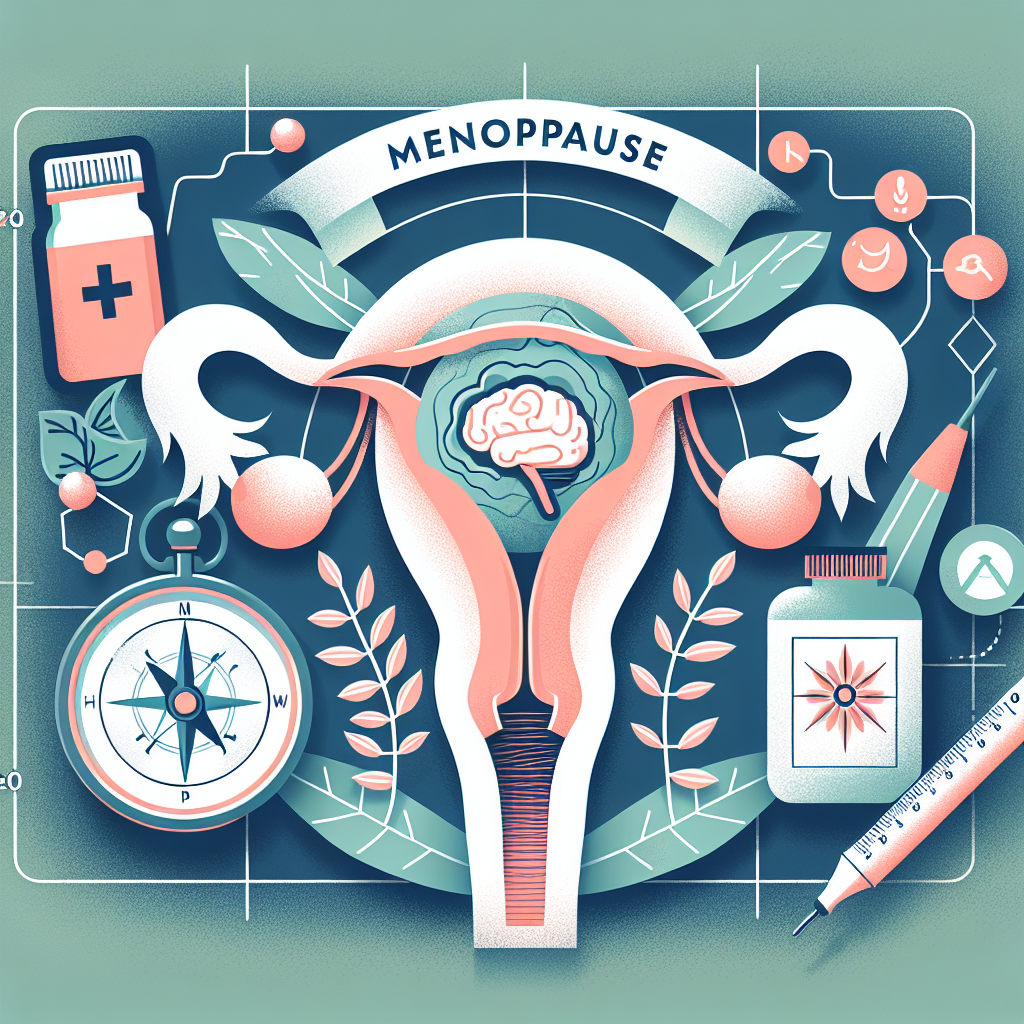Navigating Menopause with Functional Medicine

Discover how to navigate menopause with functional medicine. Learn more about this holistic approach and how it can help you manage your symptoms. Click here to start your journey towards vibrant vitality.
Exploring the Role of Functional Medicine in Alleviating Menopause Symptoms
Menopause, a natural biological process, marks the end of a woman’s menstrual cycles. It is a significant milestone in a woman’s life, often accompanied by a myriad of symptoms that can range from mild to severe. These symptoms include hot flashes, night sweats, mood changes, sleep disturbances, and weight gain, among others. While these symptoms are a normal part of the transition, they can significantly impact a woman’s quality of life. This is where functional medicine comes into play.
Functional medicine is a holistic, patient-centered approach to healthcare that focuses on identifying and addressing the root cause of diseases. Instead of merely treating the symptoms, functional medicine practitioners delve deeper to understand the underlying causes of a patient’s health issues. They consider various factors such as genetics, environmental influences, and lifestyle choices that contribute to long-term health and chronic diseases.
In the context of menopause, functional medicine offers a unique perspective. It views menopause not as a disease but as a natural transition in a woman’s life. It acknowledges that the symptoms associated with menopause are often a result of imbalances in the body, particularly hormonal imbalances. Therefore, the goal of functional medicine in managing menopause is to restore balance and optimize the body’s natural functions.
One of the key principles of functional medicine is individualized care. Every woman experiences menopause differently, with varying symptoms and severity. Functional medicine practitioners take into account these individual differences and tailor treatment plans accordingly. They may recommend changes in diet, exercise, stress management techniques, and sleep habits, along with targeted nutritional supplementation.
Diet plays a crucial role in managing menopause symptoms. A functional medicine approach emphasizes a nutrient-dense diet rich in fruits, vegetables, lean proteins, and healthy fats. These foods provide essential vitamins and minerals that support hormonal balance and overall health. Additionally, certain foods, such as those rich in phytoestrogens, can help alleviate menopausal symptoms. Phytoestrogens are plant-based compounds that mimic the effects of estrogen in the body, helping to balance hormone levels.
Exercise is another vital component of a functional medicine approach to menopause. Regular physical activity can help manage weight gain, improve mood, and promote better sleep, all of which can be challenging during menopause. Functional medicine practitioners often recommend a combination of aerobic exercise, strength training, and flexibility exercises to support overall health and wellbeing.
Stress management is also essential during menopause. High stress levels can exacerbate menopausal symptoms and contribute to hormonal imbalances. Techniques such as mindfulness, meditation, and yoga can help manage stress and promote a sense of calm and wellbeing.
Lastly, functional medicine recognizes the importance of quality sleep during menopause. Sleep disturbances are common during this transition, and poor sleep can worsen other menopausal symptoms. Practitioners may recommend various strategies to improve sleep hygiene, such as maintaining a regular sleep schedule and creating a restful sleep environment.
In conclusion, functional medicine offers a comprehensive and individualized approach to managing menopause. By focusing on the root causes of symptoms and promoting overall health and wellbeing, it can help women navigate this significant life transition with greater ease and comfort. While menopause is a natural part of life, it doesn’t have to be a distressing or uncomfortable experience. With the right support and guidance, women can embrace this new phase of life with confidence and vitality.
Understanding the Impact of Functional Medicine on Hormonal Balance during Menopause

Navigating menopause can be a challenging journey for many women. The transition, which marks the end of a woman’s reproductive years, is often accompanied by a host of physical and emotional changes. These changes are primarily driven by fluctuations in hormone levels, particularly estrogen and progesterone. Traditional medicine often addresses these symptoms with hormone replacement therapy (HRT), but this approach is not without its risks and side effects. This is where functional medicine comes into play, offering a holistic and personalized approach to managing menopause and its associated symptoms.
Functional medicine is a form of healthcare that focuses on identifying and addressing the root cause of diseases. It views the body as an integrated system, rather than a collection of independent organs divided by medical specialties. This approach allows for a more comprehensive understanding of health and disease, taking into account the complex web of interactions in the patient’s history, physiology, and lifestyle that can lead to illness.
In the context of menopause, functional medicine seeks to understand the underlying imbalances that contribute to symptoms such as hot flashes, mood swings, and weight gain. It recognizes that hormonal balance is not just about estrogen and progesterone, but also involves other hormones such as cortisol, insulin, and thyroid hormones. By addressing these imbalances, functional medicine can help alleviate menopausal symptoms and improve overall health.
One of the key principles of functional medicine is the belief in the body’s inherent ability to heal itself, given the right conditions. This means that instead of simply prescribing medication to mask symptoms, functional medicine practitioners aim to support the body’s natural healing processes. This could involve dietary changes, stress management techniques, exercise, and nutritional supplements, all tailored to the individual’s unique needs and circumstances.
For instance, a functional medicine practitioner might recommend a diet rich in phytoestrogens, plant compounds that can mimic the effects of estrogen in the body, to a woman experiencing severe hot flashes. Or, they might suggest a stress management program for a woman whose menopausal symptoms are exacerbated by high levels of stress. The goal is not just to manage symptoms, but to promote optimal health and wellbeing.
Functional medicine also recognizes the importance of the gut in overall health. Research has shown that gut health can impact hormonal balance, and that an imbalance in the gut microbiome can contribute to menopausal symptoms. Therefore, a functional medicine approach to menopause might also involve strategies to improve gut health, such as probiotics or dietary changes.
In conclusion, functional medicine offers a holistic and personalized approach to navigating menopause. By focusing on the root causes of symptoms and supporting the body’s natural healing processes, it can help women manage menopause in a way that aligns with their individual needs and promotes overall health. While it may not be the right approach for everyone, it is certainly worth considering for those seeking a more natural and comprehensive approach to managing menopause.
The Benefits of Functional Medicine in Managing Menopause: A Comprehensive Guide
Navigating menopause can be a challenging journey for many women. The transition, which marks the end of a woman’s reproductive years, is often accompanied by a host of physical and emotional changes that can significantly impact quality of life. These changes, which can include hot flashes, night sweats, mood swings, and sleep disturbances, are largely due to fluctuations in hormone levels. While traditional medicine often focuses on treating these symptoms individually, functional medicine offers a more comprehensive approach.
Functional medicine is a holistic, patient-centered approach to healthcare that seeks to address the root causes of disease rather than simply treating symptoms. It emphasizes the importance of a balanced and healthy lifestyle, including proper nutrition, regular exercise, stress management, and adequate sleep. In the context of menopause, functional medicine can provide a comprehensive guide to managing the transition in a way that promotes overall health and well-being.
One of the key benefits of functional medicine in managing menopause is its focus on individualized care. Every woman’s experience with menopause is unique, and functional medicine recognizes this by tailoring treatment plans to each individual’s specific needs and circumstances. This can involve a combination of dietary changes, nutritional supplements, exercise programs, and stress management techniques, all designed to help balance hormone levels and alleviate menopausal symptoms.
Another significant advantage of functional medicine is its emphasis on prevention. Rather than waiting for symptoms to occur and then treating them, functional medicine practitioners work with patients to identify potential risk factors and implement strategies to prevent health issues from arising. This proactive approach can be particularly beneficial during menopause, a time when women are at increased risk for a number of health conditions, including heart disease and osteoporosis.
Functional medicine also promotes the use of natural therapies wherever possible. This can be a welcome alternative for women who are wary of the side effects associated with conventional hormone replacement therapy (HRT). While HRT can be effective in managing menopausal symptoms, it also carries potential risks, including an increased risk of breast cancer, heart disease, and stroke. Functional medicine practitioners often recommend natural alternatives to HRT, such as phytoestrogens, which are plant-based compounds that can help balance hormone levels.
Finally, functional medicine recognizes the importance of emotional well-being during menopause. The transition can be a stressful time for many women, and functional medicine practitioners are trained to provide support and guidance in managing this stress. This can involve techniques such as mindfulness, meditation, and yoga, which have been shown to reduce stress and improve mood.
In conclusion, functional medicine offers a comprehensive, holistic approach to managing menopause that goes beyond simply treating symptoms. By focusing on individualized care, prevention, natural therapies, and emotional well-being, functional medicine can help women navigate the menopausal transition in a way that promotes overall health and well-being. While menopause is a natural part of life, it doesn’t have to be a distressing or uncomfortable experience. With the right guidance and support, women can embrace this new phase of life with confidence and vitality.